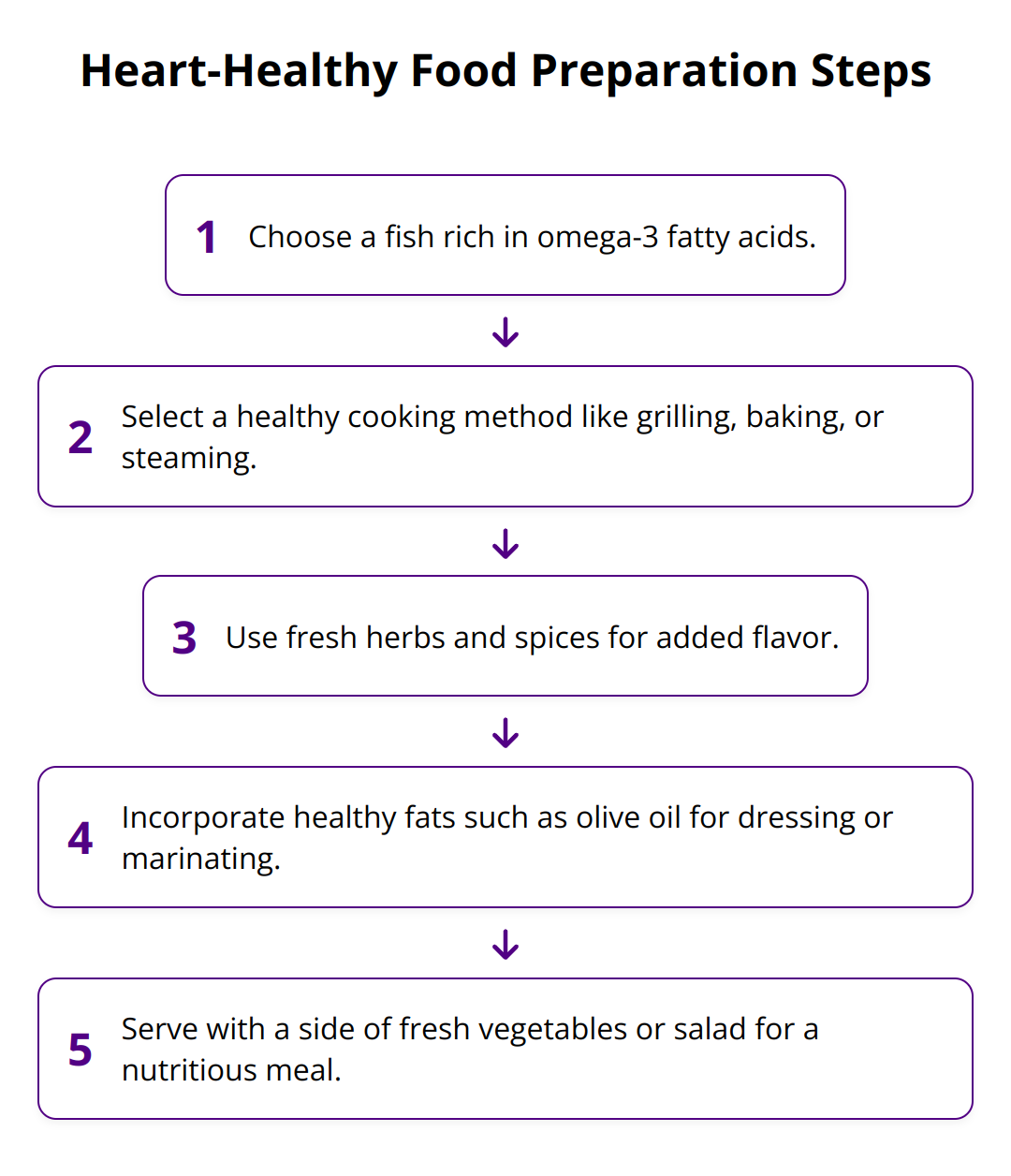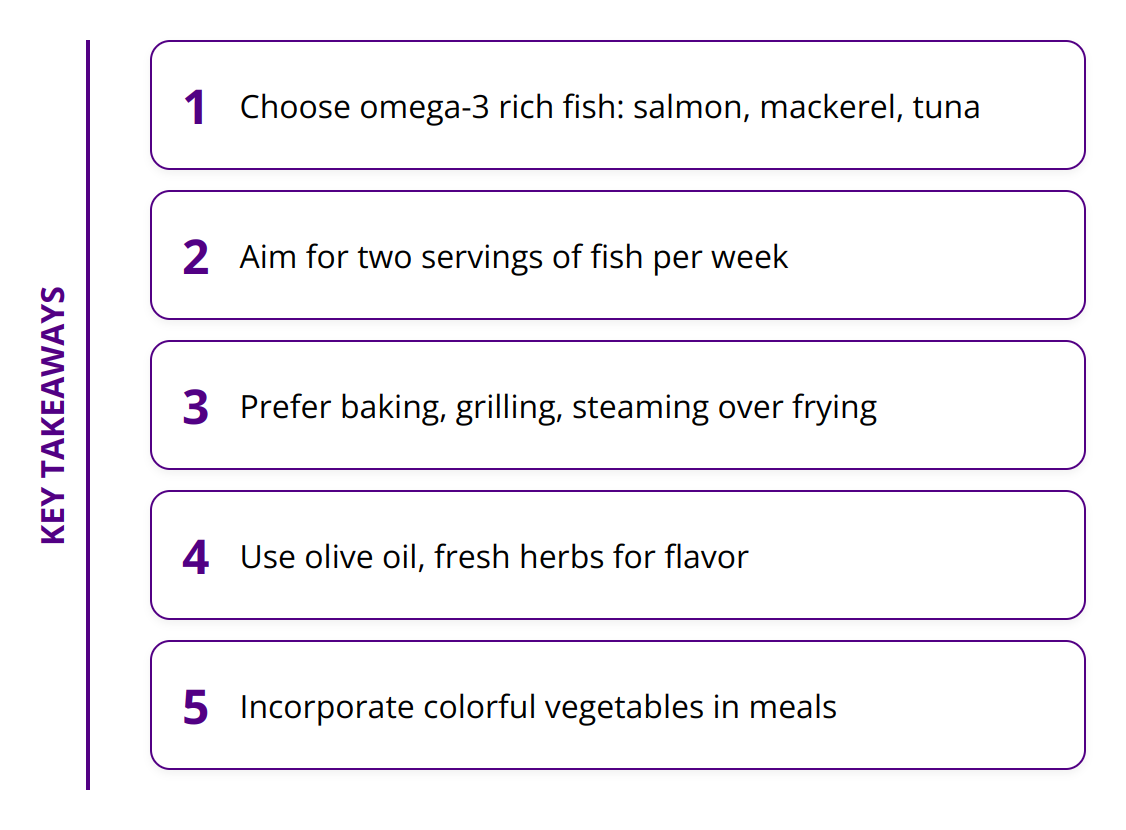Why Heart-Healthy Fish Recipes Are Important

Heart-healthy diets have gained significant attention for their role in improving overall health and well-being. At Healthy Tips You Blog, we understand the importance of incorporating nutrient-rich foods like fish into your meals.
Packed with omega-3 fatty acids, proteins, and essential vitamins, fish are a powerhouse of nutrients vital for heart health. Let’s explore how adding more fish to your diet can benefit your heart and share some delicious heart-healthy fish recipes to get you started.
Why Include Fish in Your Diet
In the world of heart-healthy foods, fish stands out for its impressive nutritional profile, offering a wealth of benefits for your heart and overall health. Understanding the specifics can help you make informed choices about incorporating fish into your diet.
Fish is incredibly rich in omega-3 fatty acids, which are essential for maintaining heart health. These fatty acids are known to reduce inflammation throughout the body, lower blood pressure, and decrease triglycerides. Moreover, omega-3s can help prevent heart disease and stroke by slowing down the development of plaque in the arteries and improving blood lipid levels.

Beyond omega-3s, fish is a fantastic source of high-quality protein while being low in saturated fats. This makes it a superior choice for muscle building and maintenance without the added risk of elevating bad cholesterol levels, a common concern with other types of animal proteins.
The benefits don’t stop there. Fish also delivers a bounty of vitamins and minerals, including Vitamin D and B2 (riboflavin), calcium, phosphorus, iron, zinc, iodine, magnesium, and potassium. These nutrients are crucial for bone health, energy production, immune function, and more. Specifically, Vitamin D plays a pivotal role in calcium metabolism and immune function, while the B vitamins are essential for energy production and the creation of red blood cells.
Given its nutrient-rich composition, it’s clear why eating fish at least twice a week is recommended by the American Heart Association. But it’s not just about quantity; the quality and preparation of fish matter too. Opt for cooking methods like baking, grilling, or steaming over frying to preserve health benefits and minimize unhealthy fat intake.

For those interested in boosting their heart health through diet, incorporating fish dishes can be a delicious and effective strategy. From simple grilled salmon to complex seafood stews, the versatility of fish makes it easy to enjoy in a multitude of recipes. For a deeper dive into preparing heart-healthy fish dishes, exploring our Mediterranean diet recipes can offer both inspiration and practical guidance.
In sum, including fish in your diet provides essential nutrients beneficial for heart health, supports muscle maintenance, and offers a versatile ingredient for a variety of dishes. Making it a regular part of your meal planning is a practical step toward a healthier life.
How Does Fish Benefit Heart Health?
Eating fish regularly plays a crucial role in maintaining heart health, thanks to its high content of omega-3 fatty acids and other vital nutrients. Omega-3 fatty acids are particularly beneficial for the heart. They work by reducing inflammation—a key factor in heart disease—and by decreasing triglycerides, lowering blood pressure, and preventing blood clots. This potent mix of benefits directly contributes to reducing the risk of heart diseases and strokes, making fish consumption a smart choice for anyone looking to support their cardiovascular health.

Lowering the Risk of Heart Disease
Regular intake of fish has been linked to a lower risk of heart disease. Omega-3 fatty acids found in fish like salmon, mackerel, and sardines play a significant role in heart health by reducing inflammation and the accumulation of plaque in the arteries. This not only helps in preventing heart attacks but also aids in improving overall heart function. For optimal heart health, aiming for at least two servings of omega-3 rich fish per week is recommended.
Improving Blood Pressure and Cholesterol
Incorporating fish into your diet can also have a positive impact on your cholesterol levels and blood pressure, two critical factors in the risk of cardiovascular diseases. Omega-3 fatty acids help to lower blood pressure, a major risk factor for heart disease, by enhancing blood vessel function. Additionally, eating fish can lead to a decrease in bad cholesterol levels and an increase in good cholesterol, further protecting the heart.
Supporting Healthy Blood Vessels and Circulation
Beyond the direct benefits to heart health, omega-3 fatty acids improve the health of blood vessels themselves by increasing their elasticity, which enhances blood flow and prevents clotting. This means not only a healthier heart but also a better overall circulatory system, contributing to improved organ function and a lower risk of stroke.
Fish is not just a food item; it’s a powerful source of vital nutrients that support heart health in various ways. By making fish a regular part of your diet, you can enjoy the delicious flavors and reap significant cardiovascular benefits.
For those looking to enhance their diet with fish, exploring heart-healthy recipes can be a great start. Discover tasty and nutritious options through our heart-healthy fish recipes guide to bring diversity and health to your table.
To maximize the benefits of fish consumption:
- Choose omega-3-rich fish like salmon and mackerel
- Aim for at least two servings per week
- Prefer baking, grilling, or steaming over frying
- Incorporate a variety of fish to balance nutrient intake and minimize potential contaminant exposure
By understanding these benefits and adjusting your diet to include more fish, you’re taking a significant step towards a healthier heart and a healthier life.
Heart-Healthy Fish Recipes
Eating fish is not just a treat for your taste buds, but a boon for your heart too. The key is in choosing the right recipes that maximize health benefits without compromising on taste. Let’s dive into some heart-healthy fish recipes that are both delicious and full of nutrients.
Grilled Salmon with Avocado Salsa
Grilled salmon is a classic heart-healthy dish, rich in omega-3 fatty acids. Pairing it with avocado adds a dose of healthy fats, fiber, and a creamy texture that complements the fish perfectly. The trick to getting the most out of this dish is to grill the salmon to perfection—just until it flakes easily but remains moist inside. Use a rub of olive oil, garlic, and herbs for extra flavor without adding unhealthy fats.
- Ingredients: Fresh salmon fillets, ripe avocados, onions, cilantro, lime juice, olive oil, garlic, salt, and pepper.
- Method: Grill salmon after marinating with olive oil and herbs. Mix diced avocados, onions, cilantro, lime juice, salt, and pepper to make the salsa. Serve the grilled salmon topped with the avocado salsa.
Baked Trout with Lemon and Herbs
Baking is a superb method to cook fish without added fats, keeping the dish healthy and light. Trout, baked with lemon and herbs, is a feast of flavors. This dish is simple yet sophisticated, keeping the trout moist and tender. Using herbs like dill or parsley not only adds freshness but also boosts the antioxidant content.
- Ingredients: Trout fillets, lemon slices, fresh herbs (dill, parsley), olive oil, salt, and pepper.
- Method: Place trout fillets on a baking sheet, top with lemon slices and herbs, drizzle with olive oil, and season. Bake until the fish is cooked through.
Tuna Salad with Olive Oil Dressing
A tuna salad is perfect for a light lunch or dinner, combining the goodness of omega-3 fatty acids with the antioxidant properties of fresh vegetables. Using olive oil as a dressing instead of mayonnaise cuts down on unhealthy fats. Add a variety of colorful vegetables to make this dish a nutritional powerhouse.
- Ingredients: Canned tuna (in water), mixed salad greens, tomatoes, cucumbers, olives, red onions, olive oil, lemon juice, mustard, salt, and pepper.
- Method: Mix the drained tuna with salad greens, tomatoes, cucumbers, and olives. For the dressing, whisk together olive oil, lemon juice, mustard, salt, and pepper, and toss with the salad.
For more inspiration on heart-healthy meals, explore our guide on Mediterranean diet snacks.
Key Tips for Heart-Healthy Cooking:
- Choose omega-3-rich fish like salmon, mackerel, or tuna.
- Opt for healthy cooking methods such as grilling, baking, or steaming.
- Incorporate fresh herbs and spices for flavor without added sodium.
- Use healthy fats like olive oil for dressing and marinating.

By incorporating these heart-healthy fish recipes into your diet, you’re not only indulging in delicious meals but also making strides towards a healthier heart and body. Remember, variety is key to balancing nutrient intake, so feel free to experiment with different types of fish and preparation methods to keep your meals exciting and nutritious.
Wrapping Up
Heart-healthy fish recipes are more than just delicious meals. They’re vital components of a diet aimed at enhancing cardiovascular health and ensuring overall well-being. Incorporating fish into your diet brings a host of benefits, thanks to their high content of omega-3 fatty acids, proteins, and essential nutrients. These nutrients are instrumental in reducing inflammation, lowering blood pressure, and improving blood lipid profiles, which collectively work to reduce the risk of heart disease and stroke.

We at Healthy Tips You Blog advocate for a varied and balanced diet that includes fish at least twice a week. Not only does this practice support heart health, but it also introduces delicious and nutritious meal options to your diet. Through the dishes we’ve shared and the tips on preparation methods, we hope to inspire you to include more fish in your meals. The Mediterranean diet, with its emphasis on heart-healthy fats, lean proteins, and an abundance of fruits and vegetables, serves as an excellent model for incorporating these principles into your daily eating habits.
To explore more about heart-healthy eating and discover a world of flavorful and beneficial meals, visit Healthy Tips You Blog. Our collection, from Mediterranean diet recipes to diverse heart-healthy fish dishes, offers everything you need to make informed and tasty dietary choices.
With each fish dish you prepare, you’re taking a step towards better heart health and enriching your diet with essential nutrients. Let’s embrace the diversity of seafood available and the multitude of ways it can be prepared. Remember, the journey to a healthier heart and a more vibrant life doesn’t have to sacrifice flavor. Through thoughtful selection and preparation of fish, we can enjoy meals that are as pleasing to the palate as they are beneficial to our hearts.






